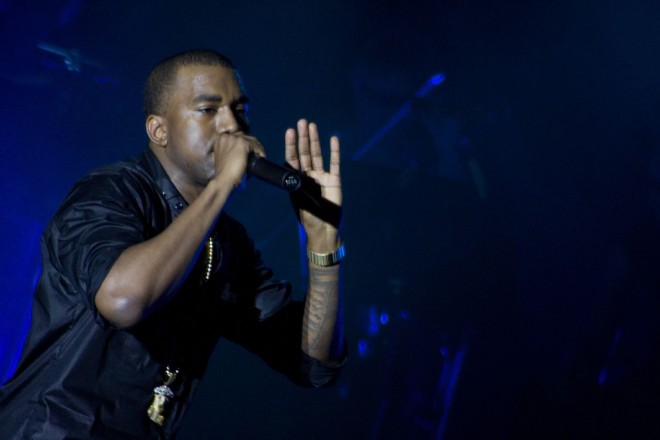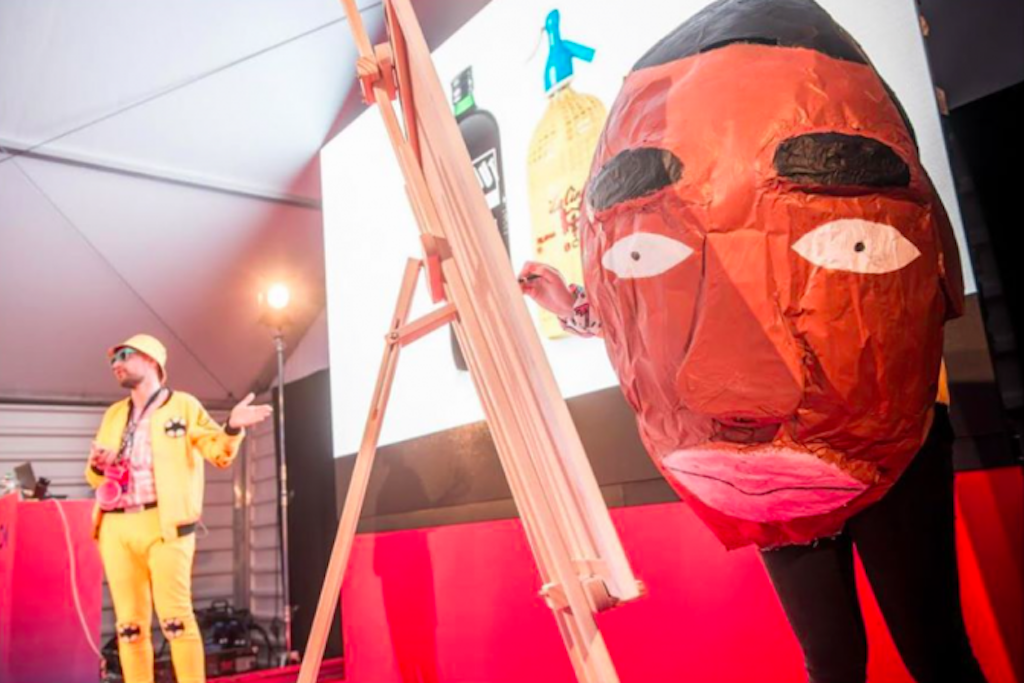Stop Using Kanye West As Your Punching Bag
Splendour In The Grass' 'Sad Kanye' reveals the problem with how we talk about the artist.

Earlier this week Splendour In The Grass announced their arts and craft lineup, and amidst the fun sounding light projections and the famous Arch Tunnel entrance, there was one work that grabbed headlines: a 10-metre-high inflatable version of Kanye West looking sad.
The work was officially titled ‘Sad Kanye’ and it’s been made by Spanish art group Hungry Castles, who were responsible for last year’s giant ‘Mr Poopie’ installation. Plenty of people on social media have pointed out the work could be seen to be mocking mental illness, given Kanye’s recent hospitalisation for psychosis.
In response to the criticism, Hungry Castles released a statement saying “it was never our intention to start a dialogue about mental health issues” and explained that the project was inspired by the “Sad Kanye” meme. They added that the work would be retitled “Happy Kanye” and said it was a “good thing” the issue had highlighted mental health.
The retitling of the work is pretty awkward, considering the inflatable head will still presumably feature Kanye… looking sad. But the decision to commission the installation, and the way it was promoted, suggests there were plenty of people who didn’t see anything weird about revelling in Kanye’s heavily’s publicised mental health issues.
It seems pretty jarring in an era awash with “mental health awareness” campaigns focused on destigmatising the issue, often at the expense of funding services to actually provide people with support and solutions.
It’s hard to see it as anything other than a symptom of our enormous, long-term, and hugely unwarranted antipathy towards Kanye, built up over years of holding him to a standard wildly different to that of his peers.
“Why Is Kanye So Sad?”
“Why the sad face Kanye?” the artwork blurb stated in its media release this week. “Why you got that resting bitch face, dog? Sometimes you crazy but you’re a dope ass producer and writer,” Hungry Castles added.
On top of being patronising (everyone knows Kanye is a dope ass producer and writer, including Kanye) the questions are just dumb. We know why Kanye is sad. He’s been battling deep depression. It’s not a secret. He talks about it regularly in his music. Despite the trope of Kanye as a “crazy” artist oblivious to how he’s perceived, he’s highly aware of what people say about him and he addresses it time and time again.
It’s actually hard to think of a contemporary artist who talks as honestly about everything he’s feeling and how it’s influenced all the events in his life. For example, we know how the death of his mother in 2007 had a profound effect on him because he’s talked about it in his music.
In ‘Clique’ he raps “Went through, deep depression when my mama passed, suicide, what kinda talk is that?” In the last couple of years, themes of mental health have become more and more common in Kanye’s music. The track ‘I Feel Like That’ is essentially an acknowledgement of his anxiety and depression.
“Do you experience nervousness or shakiness inside, faintness and dizziness? The idea that someone else can control your thoughts. Feeling others are to blame for most of your thoughts. Trouble remembering things, feeling easily annoyed and irritated. Feeling afraid in open spaces or in public. Thoughts of ending your life. Feeling that most people could not be trusted. Poor appetite, heart or chest pains?”.
You don’t need Genius annotations to figure out what he’s trying to say.
In ‘FML’, off last year’s The Life Of Pablo, he raps about taking Lexapro, an anti-depressant. In ‘No More Parties In LA’, off the same album, he talks about seeing a psychiatrist. ‘Saint Pablo’ is an incredibly raw insight into everything going on in his head, during a period of incessant media reporting on his “meltdowns”, feud with long-time mentor Jay-Z and controversial tweets.
“People tryna say I’m goin’ crazy on Twitter,
My friends’ best advice was to stay low.”
“The media said he’s way out of control
I just feel like I’m the only one not pretendin’
I’m not out of control, I’m just not in they control.”
This is an artist who is acutely aware of what is being written and said about him. But despite that, he shares an incredibly deep and intimate insight into his life and the state of his mental health. If it was another artist, it’s easy to see them being lauded as ‘courageous’ and ‘brave’ for breaking down the stigma around mental health and talking so honestly about their state of mind.
Does knowing this much about Kanye and his wellbeing change how he’s reported on or perceived? Nope. Instead of acknowledging his struggle, we get breathless reporting of “rants” and audio leaks from backstage, designed to fuel the perception of him as the ‘crazy artist’.
And now we have a giant inflatable version of him looking sad, with everyone involved either oblivious to this context (unlikely) or willing to look past it. This isn’t to say the work should be condemned or decommissioned. Art should be challenging and it should confront issues, even if they’re complicated or taboo. But this work, and the way it’s been sold to the public, doesn’t engage with Kanye. It takes the piss out of him, and his mental health, for the benefit of a huge festival and the attendees who get their kicks out making fun of Kanye without even really knowing why.
It’s hard to see another celebrity with the same profile and the same public battle with depression being treated the same way. The artists can argue they are just responding to a meme, but memes don’t exist in a vacuum. The staying power of ‘Sad Kanye’ itself demonstrates how Kanye has become a global punching bag.
We Hold Kanye To A Different Standard
There are a lot of people who hate Kanye, and are therefore indifferent to calls that he deserves to be treated like any other human dealing with a lot of intense shit. A lot of that is driven by hostility to his bravado.
Kanye regularly compares himself to musical giants like Michael Jackson, intellectuals like Einstein and tech visionaries like Steve Jobs. If that seems absurd to you, welcome to hip-hop. He’s hardly the first artist to boost his ego through his raps. And to be honest, he’s more deserving of these comparisons (particularly the musical ones) than most of his contemporaries.
Kanye’s sold millions and millions of records. He’s produced incredible albums for Beyonce, Jay-Z and Frank Ocean. Even Prince called ‘Gold Digger’ “perfect”. His influence is undeniable. One of the recent truisms in pop music is that without Kanye’s 808s and Heartbreaks there would be no Drake. He deserves the hype.
It takes a lot of wilful disbelief to deny Kanye’s artistic talent, influence and impact.
Even if you don’t think he’s musically as important as Michael Jackson, it takes a lot of wilful disbelief to deny his artistic talent, influence and impact. There’s just no basis to hate him because you don’t think he’s good. I’m sorry, but you’re wrong.
The most recent wave of Kanye-hate was kicked off by his public relationship with Donald Trump. Late last year, after Trump had won the presidential election, Kanye met with him at Trump Towers in New York. He copped a lot of heat for that meeting, including suggestions from media commentators that he “doesn’t care about black people”. He later tweeted that he had met with Trump to discuss multiculturalism and violence in his hometown of Chicago.
His wife, Kim Kardashian, said in an interview this week that the purpose of the meeting was to try and influence the newly-elected president. Whatever your views on Trump, it’s hard to argue the intense response wasn’t over the top, especially compared to how other high-profile Americans have been treated for hanging out with the president.
Until this week Elon Musk, the founder of Tesla, was a member of Trump’s advisory council. Musk resigned in response to Trump’s decision to withdraw from the Paris climate agreement, but he was happy to stay on board right through the Muslim ban and the controversy around Trump’s ties with Russia. That’s a lot more than one brief meeting at Trump Tower.
Did those ties to the White House change how people treated Musk? Nope, he continued to be lauded for his work, including by progressives and environmentalists. But when it comes to Kanye, his artistry becomes irrelevant after one meeting.
Why Does This Keep Happening?
So why is it that we feel so comfortable ridiculing and deriding Kanye, even to the extent that we’re making fun of his mental health for laughs? If you ask Kanye, it’s about race.
On ‘Saint Pablo’ he raps about the media controversies focusing on him:
“Most blacks with money have been beaten to submission
Yeezy with the big house, did it way different.”
He knows America is hostile to successful black people, and he’s letting us know he’s not going to cop it.

Photo: Marcus Linder/WikiCommons
Race has long been a defining feature of the public’s perception of Kanye. It was a major factor the few times he crossed over from being just a hip-hop artist to being a public figure. Think “George Bush doesn’t care about black people” and Taylor Swift vs. Beyonce at the VMAs. Kanye spent years grappling with the fall-out from those episodes, and as I’ve written before it’s when Kanye takes on figures that represent wholesome, white America that he attracts the most ridicule, scorn and vitriol.
If you need more proof that America still can’t handle successful black people, just look at the recent LeBron James news. James is probably the most high-profile basketball player in America. He’s a national icon. And, like Kanye, he’s regularly spoken out on issues of race — including Black Lives Matter. This week a racial slur was graffitied on James’ house. “No matter how much money you have… being black in America is tough,” he said.
The episode is another reminder that it doesn’t matter if you’re the best basketball player in the world, or one of the greatest musicians in the world, you will still be punished for being black.
Race doesn’t explain everything about the way Kanye is treated. Some people just really don’t like his personality. Others don’t like his music. (They’re wrong, but that’s their prerogative.) But there’s a big gap between not like the guy and taking part in a public mockery, especially when it seems hard to see anyone else being treated that way.
So if you don’t like Kanye, fine. But now you know the context, stop using him as your punching bag.
–
Feature image via Roger Ferrari/WikiCommons
–
Osman Faruqi is Junkee’s News and Politics Editor. He tweets at @oz_f.
